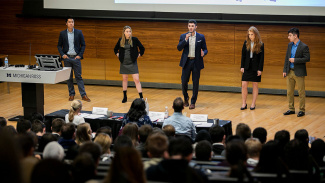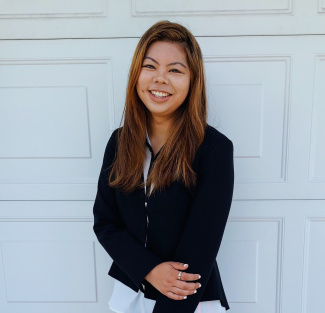Ross Reflections: Navigating the Ross Integrative Semester

By Alexa Tran, BBA ‘21
*This blog was originally published on Poets&Quants where Alexa is serving as an undergraduate columnist this year.
As a senior at the Ross School of Business, I wanted to reflect on my busiest semester of college: the Ross Integrative Semester (RIS). Not only was RIS my favorite semester, but also my last normal semester too!
RIS takes place during the first semester of junior year at Ross. When I was a first-year student, I remembered hearing about how crazy of a semester RIS is. I heard phrases like “Signature Learning Experience” and “junior year fall recruiting”. I didn’t really know what any of those words meant.
RIS was a challenging semester: academically, professionally, emotionally – you name it. Looking back, I am grateful for all of the experiences that RIS gave me. I became more reflective and learned so much about myself.
SO WHAT EXACTLY IS RIS?
When you begin your BBA curriculum as a sophomore, you are divided into eight different sections or “cohorts” of about 80 students. We take all of our core classes with our assigned section from sophomore to senior year.
Each year has its own respective Signature Learning Experience (SLE). RIS is the SLE for juniors at Ross. During RIS, students are enrolled in 10.5 credits of classes: Business Law and Ethics (BL), Management and Organizations (MO), Technology and Operations (TO), and Business Communications (BCOM).
In reality, these courses are “integrated”, with concepts from classes overlapping with one another. For example, in Business Law and Ethics, we had class discussions on how a company addresses employee classification and the effect this has on the job characteristics model, a concept we learned about in Management and Operations. In Technology and Operations and Business Law and Ethics, we talked about how product liabilities are affected by how an organization’s supply chain operates.
Ross is a huge proponent for action-based learning and this was reflected in the five different group projects that I was a part of during RIS.
THE ENTREPRENEURIAL CHALLENGE
What makes RIS particularly unique is that it concludes with an entrepreneurial challenge presented by the Zell Lurie Institute. The timeline for the challenge is tight: groups are assigned on a Wednesday, the challenge topic is introduced at the kick-off event on Thursday, and then groups are expected to give a five-minute pitch to their respective section on the following Monday.
In my year, teams were tasked with helping the University of Michigan reach its goal of reducing greenhouse gas emissions by 25% by 2025 in order to achieve carbon neutrality. My team’s idea was to reduce energy usage and paper waste by installing cellulose insulation into the walls of various campus buildings.
We put a lot of research into our pitch, created a presentation, and rehearsed (a must!) In front of the judges, we introduced our company’s business model, stated the benefits of our proposed solution, and discussed the risks associated with our venture along with mitigation strategies.
On that Monday, a first-place team is selected from each section. From there, the first place teams present their pitch to the entire BBA junior class of about 600 students in Robertson Auditorium on Tuesday. A winning team is then chosen from all of the eight teams that presented.
The energy that you feel in Robertson is unmatched because it is rare to have all 600 BBA juniors in one room together at the same time. Everyone is cheering for their section and it’s exciting to see the camaraderie amongst all eight sections.
Unfortunately, my section did not win, but it was still nice to cheer on the other teams.
MANAGING IT ALL
So now that I’ve established how busy of a semester RIS was, I can share how I managed to stay organized.
I’ve used Google Calendar since freshman year, but have never utilized it like I did during RIS. Everything in my Google Calendar was color-coded – classes were yellow, recruiting events were blue, group meetings were purple, and personal meetings were pink.
Google Calendar is great because I loved being able to send calendar invites to group members for our group meetings. This allowed us to keep track of who would be able to attend meetings. Everyone on the calendar invite also conveniently receives reminders 10 minutes prior to a meeting.
Plus, as a visual learner, this really helped me keep track of all of the different commitments that I had. I liked being able to see where my time was being spent.
BE INTENTIONAL
During RIS, I learned that I had to be really intentional about where I chose to spend my time. There are only 24 hours in a day! It’s important to not overexert yourself and be realistic about what you can actually accomplish.
I’m not going to sugarcoat it: during RIS there were a lot of readings and assignments to keep track of. For my Business Law and Ethics (BL) class, there were at least 20 pages of readings and a mini case with questions that we had to prepare for each class! There were some days where I didn’t do some readings because I was working on an assignment for another class, doing interview prep, or I simply did not have the time.
The group assignments were staggered for each class so there wasn’t always something due every week for every class. Nevertheless, being enrolled in four different classes allowed for at least one group assignment to be due every week.
I probably met with the same two different groups every week and then would meet with the other three groups during the next week. It was really dependent on what assignments were due that week.
During RIS, I had to step back and re-evaluate what my priorities were for the semester. My priorities happened to be recruiting for a summer 2020 marketing internship and academics. At the time, I was committing myself to volunteering, being an active member of multiple student organizations, and serving as a microeconomics tutor.
Two weeks into RIS, I ended up quitting one student organization as a board member and then becoming inactive in another. This was a difficult decision to make, but I knew that I wouldn’t have been able to give 100% of myself to either organization. I had to focus on my priorities.
RECRUITING DURING RIS
The first semester of junior year is primetime for recruiting for a summer internship. It’s honestly amazing to see the breadth of companies that come to Ross to recruit: Bain & Company, Deloitte, PepsiCo, SC Johnson, American Express, Eli Lilly and Company, just to name a few.
RIS was a stressful semester for me because, in addition to juggling a heavy course load, I had to worry about recruiting for a summer 2020 marketing internship. A lot of my friends had already secured their summer 2020 internships because they were doing investment banking.
Something I had to learn during recruiting was that the timeline is different for everyone. It’s all dependent on the function and industry. My focus was on marketing, which has a later timeline than other industries. As a result, I shouldn’t have been comparing myself to my friends who already accepted their internship offers.
With recruiting, a piece of advice that I have is that it’s never too early to start! The first week of school last fall, I already had three coffee chats and four networking calls that I scheduled for myself.
I recommend scheduling networking calls and coffee chats because it gives you the opportunity to ask a lot of questions and get one-on-one time with an analyst at a company where you’re interested in working. During these calls and coffee chats, I was able to get a feel for the company culture and the kind of work that I would be doing.
REALIGNING MY VALUES
When it came to recruiting for a summer internship, I had to be realistic about the companies and roles I was applying for. There is a fine line between “shooting your shot” and wanting to drop your resume everywhere because…why not? At the end of the day, it’s important to stay true to yourself and make choices that truly align with your values.
There are so many factors to take into consideration when recruiting, such as location, industry, function, and the actual work you’d actually be doing. For example. I knew that I wanted a marketing internship, yet I found myself applying for strategy-focused roles and even some finance positions. I applied for those internships because I felt that I was capable of doing the work and they were based in appealing locations like Chicago and New York City.
However, I knew that I needed to stay true to myself and recognize that, in the long run, I wouldn’t be happy doing a finance internship. Being in a big city wouldn’t compensate for the work that I would be doing from 9-5 every day.
I am happy to say that I had an amazing summer 2020 internship experience! The company I was interning at was Eli Lilly and Company, a Fortune 500 pharmaceutical company headquartered in Indianapolis, Indiana. Here, I was a marketing intern on the new product planning team in the diabetes business unit.
RIS was a crazy semester that I’ll forever be grateful for because it gave me the opportunity to learn more about myself. I learned the importance of balance and to say no to things that didn’t serve me. I also learned to be more flexible and considerate when it came to meeting for group projects. Everything is about give-and-take.
Stay tuned for my next column, where I’ll be sharing some of my unexpected learnings from RIS!








